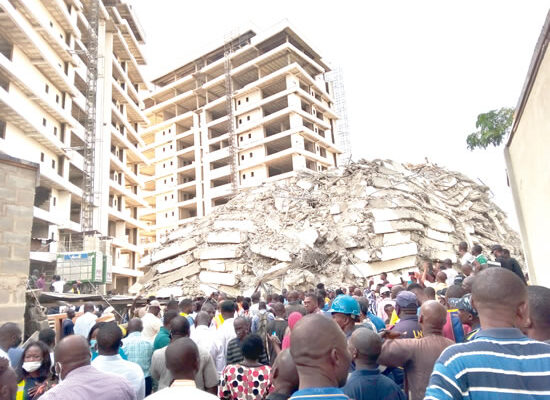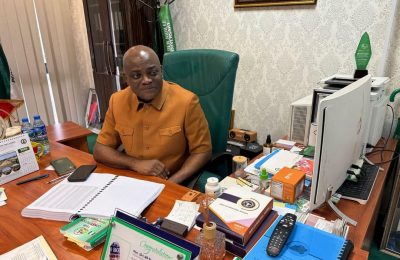Following the embarrassing incessant building collapse’s incidents in Nigeria, Lagos being the epicenter, stakeholders in the sector have come up with different approaches to end the menace in the country.
While some are canvassing for stiffer penalties against all culprits of building collapse, others are of the opinion that there should be full enforcement of physical planning law/buildings regulations, mandatory geotechnical soil report and building materials’ test, among others.

Speaking during the opening of the fourth edition of builders’ breakfast workshop tagged: ‘Building surveying practice and procedure: charting a new course in building post-construction services in Lagos’ organised by the Nigerian lnstitute of Building (NIOB), Lagos chapter,
the Director General, Standard Organization of Nigeria (SON), Mallam Farouk Salim, called on NIOB to carry out a post-construction building survey for Lagos State with a view to making recommendations towards halting the disturbing cases of building collapse.
The survey practices and procedures for building and post-construction services, he said were essential aspects of the construction industry to ensure that buildings are constructed and maintained in line with international best practices thereby promoting public safety, improving the lives and security of the citizens of Nigeria.
“The post-construction stage of buildings and construction is critical in the life cycle of a building. Surveyors and other professionals are expected to inspect buildings to ensure that they meet all relevant regulations.
“This will provide the clients with a report detailing the results of the inspections and recommendations for future maintenance or repairs,” the SON DG said.
Salim, also disclosed that SON is empowered by the provision of the Act, 2015, and relevant legislations to amongst others develop and enforce standards to ensure the quality of products, facilities, materials, and systems throughout the country.
According to him, building sector in Nigeria is faced with several challenges including lack of enforcement of existing standards and regulations.
To him, other factors responsible for building collapses include poor structural design, poor quality control measures, use of non-professional artisans, sub-standard materials, underlying soil factors and natural disasters.
He explained that in course of carrying out inspections and analyses of materials from the sites to determine the causes of building collapse, the organisation had over the years put in place measures to ensure that the construction and building sector thrives in the country.
These initiatives, he said, included the constitution of the National Standards and Quality Assurance Committee to review the Nigeria National Building Codes, sensitization of artisans in the sector, staging of quarterly monitoring of building materials such as cement, cables, galvanised steel roofing sheets, mild steel nails, reinforcement steel bars, paints and aluminium roofing sheets throughout the country and deployment of compressive test machines to all state offices to ensure that quality of sandcrete blocks and concrete cube being produced.
Besides, he said that Special Taskforce for the monitoring and enforcement of quality in the manufacturing of steel bars in the country was put in place and established laboratories in Lagos and Enugu equipped with optical emission spectrometers and universal testing machines for iron rods.
He said the agency also initiated several enforcement initiatives and collaborations with cable and cement manufacturers to ensure products meet the minimum requirement of standards.
The DG charged all the professionals to ensure that the materials used in the building and construction meet the requirements of the relevant standards.
He said the Institute as a key player in the building and construction sector must put measures in place to ensure that only competent personnel and artisans handle construction projects in the country.
General Manager, Lagos State Materials Testing Laboratory (LSMTL) , Mr Funsho Elulade, hinted that a new Law was on the way to make substandard construction impossible in the state.
He said his agency was currently under pressure for mass testing of buildings because its sister agency had recommended hundreds of defective buildings for demolition.
He said adherence to material quality and abiding by other ethical principles of construction could avert collapse, adding that the new law to force compliance would soon be enacted.
He called for collaboration with NIOB in order to chart a new way forward, adding that accurate data was important for wholistic solutions.
Elulade said the workshop was timely to address the current embarrassing crisis of buildings collapses across the state.
“I have revised the law that set up the Lagos State Materials Testing Laboratory and I pray it is accented to by the governor.
“We have pushed it to completion stage, before it goes to the exco, before exco pushes it to the House of Assembly.
“In the future, it is going to be extremely difficult for a prospective seller or developer to sell any property or rent any property to any individual in Lagos, if that developer or the landlord does not have a None Destructive Test Report.
“And I think we should incorporate the two , we can synergise, it must be mandatory that for you to sell a house or to rent your house to anybody, you must have that building survey, in addition to the none destructive test result,” he said.
He said building survey was also beneficial for prospective buyers or tenants who would be able to assess the condition of a property before taking action.
He listed conditions for charting a new course in Lagos state to include using the right materials and professionals during construction, adding that, wholistic approach was important to address all issues.
Managing Director – Primero Transport Services Ltd, Mr Fola Tinubu, said people were already afraid of buying high rise buildings in Lagos state because of collapse.
He urged the NIOB to boost investors’ confidence by chasing out “the cow boys” painting them in bad light from the profession.
Citing the 21-storey Ikoyi Building Collapse as example, he urged built environment professionals to cry out early against illegalities on site to save end users.
Registrar/Secretary, Council of the Registered Builders of Nigeria (CORBON), Mr Adetunji Adeniran, said only the government had power for prosecution and must use it for deterrence.
He made reference to various panel reports and recommendations not being implemented by government.
Adeniran stressed the need for professionalism to eradicate quackery while reeling out relevant laws which must be enforced for sustainable development.
He also reeled out efforts of CORBON both locally and globally for better practice guidelines for building surveys.
READ ALSO FROM NIGERIAN TRIBUNE







